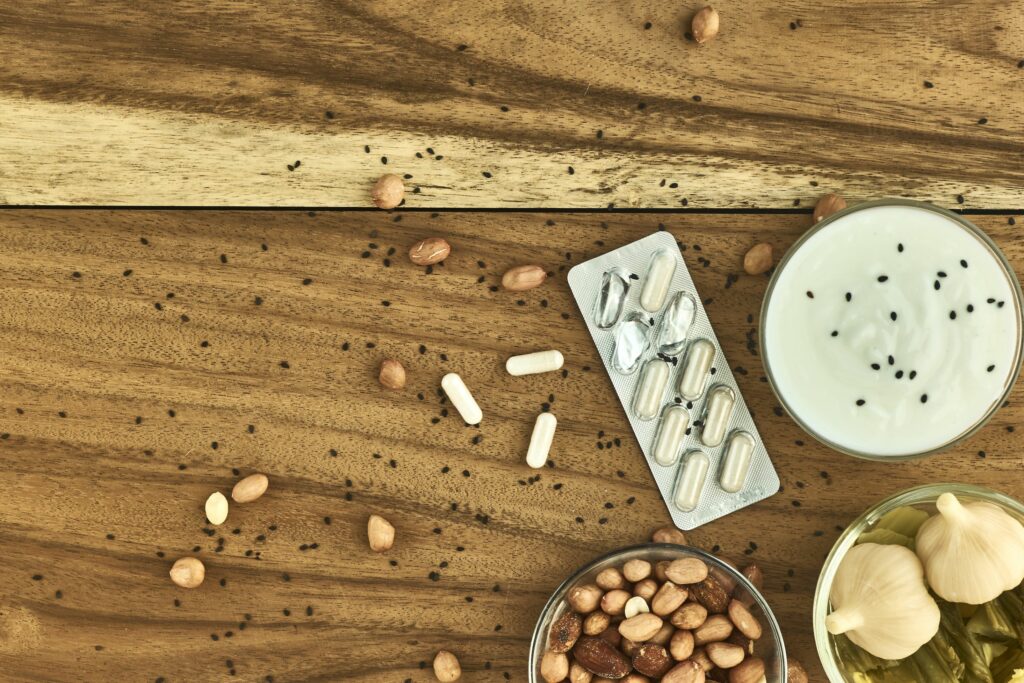Understanding Antibiotics and Gut Health
Antibiotics work by killing bacteria that cause infections. Unfortunately, they are not selective and also tend to kill beneficial bacteria in your gut. This imbalance can lead to gastrointestinal disturbances and adversely affect the immune system and nutrient absorption.
Important Nutrients During Antibiotic Use
When on antibiotics, focusing on certain nutrients can help mitigate side effects and support your immune system:
Probiotics
Live beneficial bacteria that can help restore gut flora.
Prebiotics
Non-digestible fibers that feed good bacteria in your gut.
Fibe
Helps prevent diarrhea by adding bulk to your stool.
Vitamins and minerals
Particularly B vitamins and vitamin K, which may be depleted by antibiotics.
What to Eat During Antibiotic Treatment
Fermented Foods
Fermented foods are rich in probiotics, which can help replenish good bacteria in your gut. Include:
- Yogurt (with live cultures)
- Kefir
- Sauerkraut
- Kimchi
- Miso
High-Fiber Foods
Fiber can help maintain bowel health and prevent antibiotic-associated diarrhea. Opt for:
- Whole grains like oats, barley, and quinoa
- Legumes such as beans, lentils, and chickpeas
- Fruits and vegetables, particularly those with edible skins
Fluids
Staying hydrated is crucial as fluids help reduce the risk of dehydration especially if diarrhea occurs. Drink plenty of:
- Water
- Herbal teas
- Coconut water
Lean Proteins
Adequate protein intake supports the immune system and helps repair body tissues. Choose lean options like:
- Chicken or turkey breast
- Fish
- Eggs
- Plant-based proteins such as tofu and tempeh
What to Eat After Antibiotic Treatment
Post-antibiotic care should focus on continuing to support gut health and replenishing good bacteria. Continue eating:
Probiotic-rich food
To continue restoring gut flora.
Prebiotic-rich foods
Such as bananas, onions, garlic, and asparagus to feed beneficial bacteria.
A diverse diet
To encourage a diverse microbiome, eat a wide variety of foods.
Foods to Avoid During and After Antibiotics
Certain foods can interfere with how your body absorbs antibiotics or might exacerbate side effects:
Alcohol
Can interfere with antibiotic effectiveness and increase side effects.
Grapefruit and grapefruit juice
Can interact with certain antibiotics, affecting their effectiveness.
Highly processed foods
Can aggravate gastrointestinal distress and are generally low in nutrients.
Probiotics and Antibiotics: A Symbiotic Relationship
Taking probiotics during and after antibiotic treatment can help maintain and restore the gut flora. However, it’s important to time it right:
Timing
Take probiotics at least 2 hours before or after antibiotics to avoid reducing their effectiveness.
Additional Tips for Managing Side Effects
Eat smaller, more frequent meals
This can help manage nausea, which some people experience with antibiotics.
Monitor your body’s response
Everyone reacts differently to antibiotics, so pay attention to how your body responds to different foods during this time.
Consult healthcare providers
Before making significant changes to your diet or adding supplements, talk to your healthcare provider.
FAQs About Diet and Antibiotics
Can I take probiotics with any antibiotic?
While generally safe, it’s best to consult with a healthcare provider as certain probiotic strains may be more beneficial with specific antibiotics.
How long after antibiotics should I continue to focus on my diet?
Continue to focus on a gut-friendly diet for at least several weeks after completing your antibiotic course to fully restore your gut microbiome.
Are there any supplements I should consider taking with antibiotics?
A multivitamin may help offset nutrient losses, especially in B vitamins and vitamin K. Probiotic supplements can also be beneficial, but choose a high-quality product recommended by a healthcare provider.
What if I develop severe diarrhea while on antibiotics?
Severe diarrhea may be a sign of C. difficile infection, which requires immediate medical attention. Consult your doctor if your symptoms are severe.
Can diet alone prevent all side effects of antibiotics?
While diet can significantly mitigate side effects, it may not prevent all. Monitoring and consulting with a healthcare provider is crucial.
Is it necessary to avoid dairy with antibiotics?
Dairy can interfere with the absorption of certain antibiotics. Check with your healthcare provider or pharmacist about your specific medication.
How can I restore my child’s gut health after antibiotics?
Focus on a balanced diet with plenty of fruits, vegetables, whole grains, and consider adding a child-friendly probiotic supplement.
Conclusion
Managing your diet during and after antibiotic treatment is key to minimizing side effects and enhancing your recovery. By incorporating probiotic and prebiotic-rich foods, maintaining adequate hydration, and avoiding certain foods, you can help restore your gut health and support your body’s overall well-being. Always consult with healthcare professionals before making significant changes to your diet or beginning new supplements, especially when dealing with the impacts of antibiotics.
- Kratom Energy Drinks: A Natural Alternative To Caffeine? - June 1, 2025
- What Not To Do After Temple Fillers? - May 31, 2025
- Intersectionality In Love: Navigating Overlapping Identities - May 31, 2025

